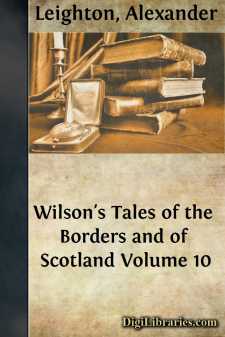Categories
- Antiques & Collectibles 13
- Architecture 36
- Art 48
- Bibles 22
- Biography & Autobiography 813
- Body, Mind & Spirit 142
- Business & Economics 28
- Children's Books 17
- Children's Fiction 14
- Computers 4
- Cooking 94
- Crafts & Hobbies 4
- Drama 346
- Education 46
- Family & Relationships 57
- Fiction 11829
- Games 19
- Gardening 17
- Health & Fitness 34
- History 1377
- House & Home 1
- Humor 147
- Juvenile Fiction 1873
- Juvenile Nonfiction 202
- Language Arts & Disciplines 88
- Law 16
- Literary Collections 686
- Literary Criticism 179
- Mathematics 13
- Medical 41
- Music 40
- Nature 179
- Non-Classifiable 1768
- Performing Arts 7
- Periodicals 1453
- Philosophy 64
- Photography 2
- Poetry 896
- Political Science 203
- Psychology 42
- Reference 154
- Religion 513
- Science 126
- Self-Help 84
- Social Science 81
- Sports & Recreation 34
- Study Aids 3
- Technology & Engineering 59
- Transportation 23
- Travel 463
- True Crime 29
Wilson's Tales of the Borders and of Scotland Volume 10
Description:
Excerpt
WILSON'S TALES OF THE BORDERS, AND OF SCOTLAND.
Notwithstanding the shortness of their days, the bitterness of their frosts, and the fury of their storms, December and January are merry months. First comes old Christmas, shaking his hoary locks, belike, in the shape of snow-drift, and laughing, well-pleased, beneath his crown of mistletoe, over the smoking sirloin and the savoury goose. There is not a child on the south side of the Borders who longs not for the coming of merry Christmas: it is their holiday of holidays, their season of play and of presents; and old and young shake hands with Christmas, and with each other. And even on the northern side of "the river," and "the ideal line by fancy drawn," which "divide the sister kingdoms," there are thousands who welcome and forget not "blithe Yule Day." Next comes the New Year—the bottle, the hot pint, and the first-foot—and we might notice, also, Hansel Monday, and "Auld Hansel Monanday," which follow in their wake, and keep up the merriment till the back of January is broken. But our business at present is with the first-foot, and we must hold. It matters not on what side of the Borders it may be—and northward the feeling extends far beyond the Borders—there is a mysterious, an ominous importance attached to the individual who first crosses the threshold, after the clock has struck twelve at midnight, on the 31st of December, or who is the first-foot in a house after the New Year has begun. The first-foot stamps the "luck" of the house—the good fortune or the evil fortune of its inmates throughout the year! But to begin with our story. There was not a person on all the Borders, nor yet in all Scotland, who attached more importance to the first-foot than Nelly Rogers. Nelly was a very worthy, kind-hearted, yea, even sensible sort of woman; but a vein of superstition ran through her sense: she had imbibed a variety of "auld-warld notions" in infancy, and, as she grew up, they became a part of her creed. She did not exactly believe that ghosts and apparitions existed in her day, but she was perfectly sure they had existed, and had been seen; she was sure, also, there was something in dreams, and she was positive there was a great deal in the luckiness or unluckiness of a first-foot; she had remarked it in her own experience thirty times, and, she said, "it was o' nae use attempting to argue her out o' what she had observed hersel." Nelly was the wife of one Richard Rogers, a respectable farmer, whose farmhouse stood by the side of the post-road between Kelso and Lauder. They had a family of several children; but our business is with the eldest, who was called George, and who had the misfortune to receive, both from his parents and their neighbours, the character of being a genius. This is a very unfortunate character to give to any one who has a fortune to make in the world, as will be seen when we come to notice the history of George the Genius—for such was the appellation by which he was familiarly mentioned. Now, it was the last night of the old year—George was about twelve years of age, and, because he was their first-born, and, moreover, because he was a genius, he was permitted to sit with his father and his mother, and a few friends, who had come to visit them, to see the old year out, and the New Year in....












